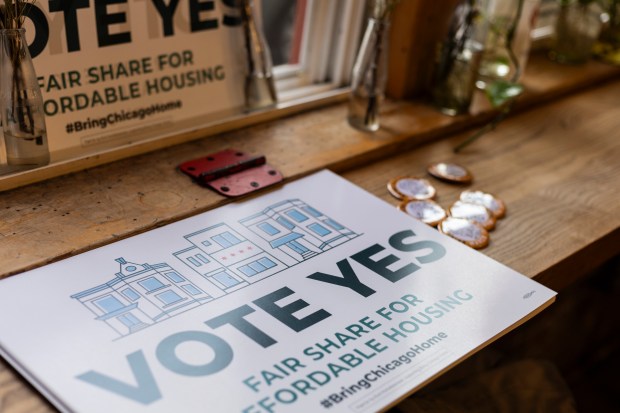As Mayor Brandon Johnson’s administration moved forward with plans to appeal a judge’s ruling against his Bring Chicago Home referendum, he called on the public to still turn out and vote for it and said he was “optimistic” supporters would eventually prevail in court.
“People should know in Chicago that the question is still on the ballot,” Johnson told reporters at an unrelated event Monday. Attorneys for the administration asked the judge to press pause on enforcement of the ruling and also filed notice they would be appealing.
Johnson did not answer when asked if his administration had erred in the drafting of the question or whether he would try to get the referendum question on November ballots if appeals failed. Friday’s decision from Circuit Court Judge Kathleen Burke found in favor of real estate interests who sued over the question’s wording and how city money would be spent.
The question remains on the ballot for now, and Burke’s ruling does not mean early or mail voting would be paused. As it stands, board of elections spokesman Max Bever said “votes will not be counted for the question” and will instead be sequestered, meaning not tallied or published. Johnson said Monday that amounts to suppression.
The Chicago Board of Election Commissioners — the main defendant in the case — will decide whether to appeal Tuesday, Bever said.
Burke’s Monday order did not shine more light on her reasoning for invalidating the question or denying the city’s attempt to intervene in the case brought by the Building Owners and Managers Association of Chicago and a cadre of groups representing builders, realtors and apartment owners.
In their motion filed Monday for a pause on enforcement, city attorneys said Burke denying the city’s move to intervene was a “clear contravention to applicable law and an abuse of the court’s discretion.” They argued the city’s filing was on time and that election board attorneys did not raise a substantive rebuttal to BOMA’s arguments because they were “not authorized” to.
The city asked to intervene on Feb. 9, 35 days after a coalition of real estate groups sued, and before the board of elections responded. At the time, they argued they were the “only party that can adequately respond” to the suit and that they would be “materially affected” by a judgment ruling in the real estate groups’ favor.
Real estate groups fought that intervention, arguing the city was aware of the suit and its schedule from the start and that they missed a chance to intervene in late January, when the board tried to move the case to a different court. Speed was key in this case, they argued, so that voters would know what votes would be counted by primary day on March 19.
“While the amount of time that Petitioner waited to seek intervention — 35 days — may not be excessive in other types (of) cases, it is an eternity in an election case,” attorneys Mike Kasper and Michael Del Galdo wrote in opposition to the city intervening, inferring the city did so deliberately “to delay the proceedings so that a final resolution comes much closer to, or even after, the primary election.”
In Monday’s motion, the city argued real estate groups “failed to allege any harm they would suffer should the vote on the referendum go forward as scheduled … for our purposes here, there is no harm in letting an election on an advisory referendum go forward. Even if it were to pass, it would still require enactment by City Council and would still be subject to all of Plaintiffs’ challenges raised in their complaint.”
In the meantime, backers of the question took to social media over the weekend to urge a yes vote and continued canvassing in person.
Dueling ads in state’s attorney race
With three weeks to go until primary day and thousands of mail ballots en route to primary voters, Democratic candidates in the open race for Cook County state’s attorney have released dueling television ads.
Retired Judge Eileen O’Neill Burke is out with a new attack ads highlighting her opponent’s past work as a corporate lobbyist and status as a “political insider.” It contrasts Clayton Harris III’s background with her work as a former prosecutor and judge who will “stem the flow of illegal guns and seek jail time for gun crimes,” a reference to her pledge to ask for detention for people arrested with automatic weapons.
Harris has the endorsement of the Cook County Democratic Party and was a lobbyist for Lyft for two years, starting in November 2020. During that time, Harris served as president of the Illinois Coalition for Independent Work, a group funded by Lyft and other driving and delivery apps that fought to maintain ride-share drivers’ work status as independent contractors. At the same time, some state and local lawmakers were pushing for workers to be treated as employees so they could potentially unionize.
That work is not a reflection of anti-union views, Harris has told reporters — he has the endorsement of several labor organizations, including the more progressive Chicago Teachers Union, SEIU Local 1 and Local 73, and Healthcare Illinois Indiana. He also has the backing of the main state legislator pushing an expansion of drivers’ benefits, Will Guzzardi — and told WBEZ he would not interfere with any efforts to unionize among employees in his office.
O’Neill Burke made it up on TV three weeks earlier than Harris, who announced his first on-air ads Monday.
The former judge has maintained her fundraising advantage: O’Neill Burke has raked in nearly $900,000 since the start of the campaign, while Harris has brought in about $580,000.
Harris’ first TV ad, called “Accountability,” is an introductory spot that features shots of his family and Harris on the campaign trail.
“I’m a former Cook County prosecutor, raising my family in this community. I know the fear that violent crime will harm the ones we love is all too common. As state’s attorney, I’ll prosecute violent crime appropriately, and ensure justice is served for all,” he says. Harris, his wife and two sons live in Washington Park.
Kaegi sinks $400k+ into Board of Review race
Cook County Assessor Fritz Kaegi’s push to dethrone Cook County Board of Review Commissioner Larry Rogers has escalated in recent weeks: Kaegi’s initial $100,000 loan to a special PAC dedicated to defeating Rogers and supporting challenger Larecia Tucker has grown to a total of $385,000 in recent weeks, according to state records. That’s on top of the more than $38,000 Kaegi, his campaign and family have given to Tucker’s campaign fund directly.
Rogers has decried the effort as hypocritical and unethical because the Board of Review hears appeals to the assessments Kaegi’s office sets and because Kaegi himself pledged previously not to interfere.
“I don’t think it’s right for the assessor to be picking commissioners,” Kaegi told Crain’s Chicago Business in 2021. At the time, he had declined to endorse or fund candidates with ties to him. That included when his former policy chief Abdelnasser Rashid ran against then-Commissioner Dan Patlak, and when a member of his transition team, Samantha Steele, ran against former Commissioner Mike Cabonargi.
“It’s important that they be an independent view of what we’re looking at,” he said at the time.
Since then, Kaegi has said the three-member board has reversed the effectiveness of his valuation reforms and criticized Rogers for being beholden to the attorneys that appeal to the board. The PAC he single-handedly funded, Stop Tax Corruption Cook County, has spent nearly $200,000 on mailers and digital ads supporting Tucker or opposing Rogers.
“This is a millionaire trying to control” assessments and deny taxpayers a fair appeal, Rogers told the Tribune Monday. Rogers, who is also a trial attorney, recently loaned $250,000 to his own campaign.
“Fritz Kaegi is upset that we grant appeals, which reduce his assessments. If his efforts are successful, he will have a former employee in Samantha Steele and a candidate that he funded” on the board, Rogers continued, “and (Tucker) will be obliged to vote with what he wants, which is denying appeals. So the independence of the agency will be obliterated through his efforts.”
An assessor backing a review commissioner is not without precedent: former Assessor James Houlihan contributed more than $330,000 to Jay Paul Deratany, who was running for a board seat against incumbent Joe Berrios in 2008, according to state records. The previous cycle, Houlihan had given $72,000 to another board candidate, the Tribune reported at the time.
Tucker is a real estate broker and clerk in the Rich Township assessor’s office.
Chicago Tribune’s Jake Sheridan contributed.
aquig@chicagotribune.com




